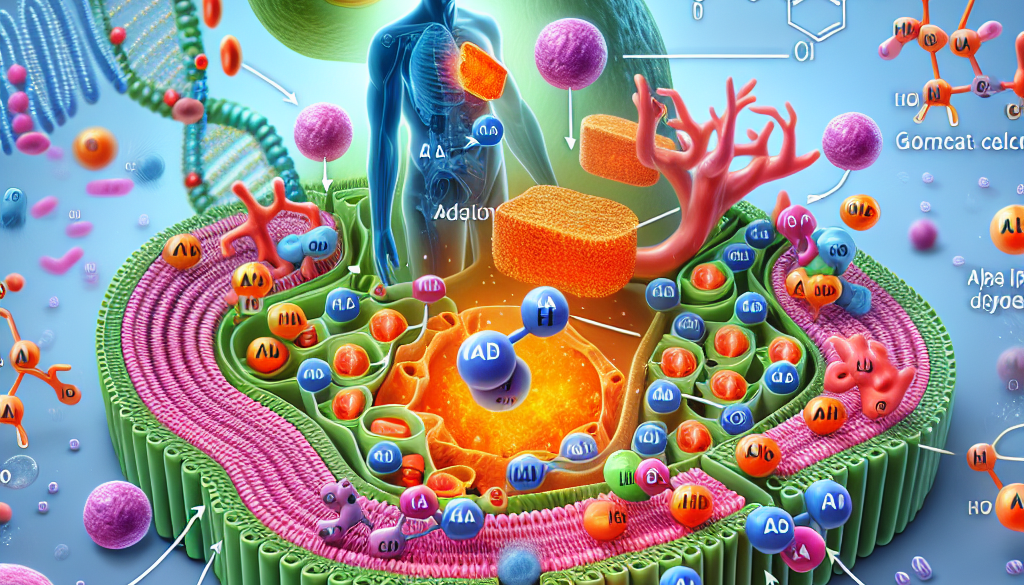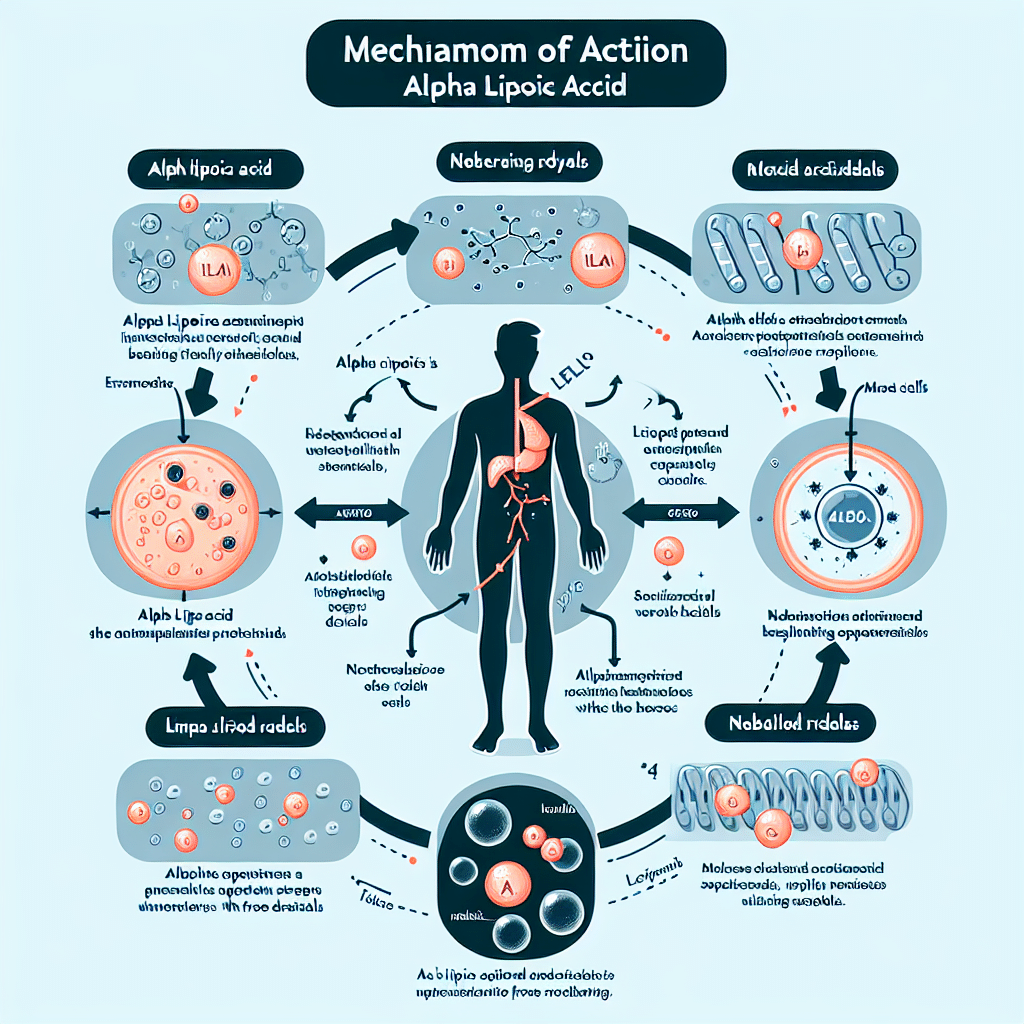Alpha Lipoic Acid Mechanism of Action Explained
-
Table of Contents
- Alpha Lipoic Acid: Unveiling Its Mechanism of Action
- Understanding Alpha Lipoic Acid
- The Antioxidant Properties of ALA
- ALA’s Role in Energy Metabolism
- ALA and Glucose Metabolism
- Neuroprotective Effects of ALA
- ALA and Inflammation
- Case Studies and Clinical Trials
- Conclusion: The Multifaceted Benefits of Alpha Lipoic Acid
- Discover ETchem’s Protein Products
Alpha Lipoic Acid: Unveiling Its Mechanism of Action
Alpha Lipoic Acid (ALA), also known as thioctic acid, is a naturally occurring compound that is gaining attention for its potential benefits in various health conditions. As a powerful antioxidant, ALA is involved in energy metabolism and offers protective effects against oxidative stress. This article delves into the intricate mechanism of action of alpha lipoic acid, exploring how it functions within the body and the potential health benefits it may offer.
Understanding Alpha Lipoic Acid
Alpha Lipoic Acid is a unique antioxidant because it is both water and fat-soluble, allowing it to work in every cell or tissue in the body. Unlike other antioxidants that work only in water (such as vitamin C) or fatty tissues (such as vitamin E), ALA is versatile in its action. Naturally found in mitochondria, the energy-producing structures within cells, ALA plays a crucial role in the conversion of glucose into energy.
The Antioxidant Properties of ALA
One of the primary mechanisms by which ALA exerts its effects is through its antioxidant properties. ALA directly neutralizes free radicals and also helps regenerate other antioxidants, such as vitamin C, vitamin E, and glutathione. This dual action makes it a potent force against oxidative stress, which is implicated in the aging process and various diseases.
- Direct Free Radical Scavenging: ALA directly interacts with free radicals, neutralizing them before they can cause cellular damage.
- Regeneration of Other Antioxidants: ALA helps to recycle other antioxidants, restoring their active forms and enhancing their protective effects.
ALA’s Role in Energy Metabolism
Alpha Lipoic Acid is a coenzyme that plays a pivotal role in the mitochondrial aerobic metabolism. It is an essential component of the enzyme complexes that catalyze the oxidative decarboxylation of alpha-keto acids, such as pyruvate and alpha-ketoglutarate, which are key steps in the production of ATP (adenosine triphosphate), the energy currency of the cell.
- Pyruvate Oxidation: ALA is a cofactor for the pyruvate dehydrogenase complex, facilitating the conversion of pyruvate to acetyl-CoA, a critical step in cellular respiration.
- Alpha-Ketoglutarate Processing: Similarly, ALA is involved in the alpha-ketoglutarate dehydrogenase complex, aiding in the citric acid cycle, which is another vital pathway for energy production.
ALA and Glucose Metabolism
Research suggests that ALA may improve insulin sensitivity and help manage blood sugar levels, which is particularly beneficial for individuals with type 2 diabetes. By enhancing glucose uptake in muscles and inhibiting glycogen synthase kinase 3, ALA promotes glucose utilization and storage, potentially improving glycemic control.
- Enhancing Insulin Sensitivity: ALA stimulates the insulin signaling pathway, leading to increased glucose uptake by cells.
- Regulating Glycogen Synthesis: By modulating the activity of enzymes involved in glycogen synthesis, ALA helps maintain optimal blood sugar levels.
Neuroprotective Effects of ALA
Alpha Lipoic Acid has shown promise in protecting against neurodegenerative diseases due to its ability to cross the blood-brain barrier. Its antioxidant action combats oxidative stress in the nervous system, and it may also chelate metals, such as iron and copper, which can accumulate and cause neuronal damage.
- Oxidative Stress Reduction: ALA’s antioxidant properties protect neurons from oxidative damage.
- Metal Chelation: By binding to heavy metals, ALA prevents them from contributing to neurodegenerative processes.
ALA and Inflammation
Chronic inflammation is a root cause of many diseases, and ALA has been shown to exert anti-inflammatory effects. It does this by influencing various signaling pathways and reducing the production of pro-inflammatory cytokines, which play a role in inflammatory responses.
- Modulation of Signaling Pathways: ALA affects NF-kB and other pathways that regulate inflammation.
- Reduction of Cytokines: ALA decreases the levels of inflammatory cytokines, mitigating inflammation.
Case Studies and Clinical Trials
Several clinical trials have investigated the effects of ALA supplementation in conditions such as diabetic neuropathy, cardiovascular disease, and weight management. For instance, the ALADIN studies demonstrated that ALA could improve symptoms of diabetic neuropathy. In terms of cardiovascular health, ALA has been shown to improve endothelial function and reduce markers of oxidative stress.
Conclusion: The Multifaceted Benefits of Alpha Lipoic Acid
In summary, alpha lipoic acid is a versatile antioxidant with a multifaceted mechanism of action that includes direct free radical scavenging, regeneration of other antioxidants, a key role in energy metabolism, glucose regulation, neuroprotection, and anti-inflammatory effects. Its potential therapeutic applications are vast, and ongoing research continues to uncover new benefits and mechanisms.
Discover ETchem’s Protein Products
If you’re interested in enhancing your health regimen with high-quality protein supplements, consider exploring ETchem’s range of protein products. Their extensive selection includes various types of collagen, catering to different dietary and health needs. ETchem’s commitment to quality ensures that you receive the best products to support your wellness journey.
About ETChem:
ETChem, a reputable Chinese Collagen factory manufacturer and supplier, is renowned for producing, stocking, exporting, and delivering the highest quality collagens. They include marine collagen, fish collagen, bovine collagen, chicken collagen, type I collagen, type II collagen and type III collagen etc. Their offerings, characterized by a neutral taste, instant solubility attributes, cater to a diverse range of industries. They serve nutraceutical, pharmaceutical, cosmeceutical, veterinary, as well as food and beverage finished product distributors, traders, and manufacturers across Europe, USA, Canada, Australia, Thailand, Japan, Korea, Brazil, and Chile, among others.
ETChem specialization includes exporting and delivering tailor-made collagen powder and finished collagen nutritional supplements. Their extensive product range covers sectors like Food and Beverage, Sports Nutrition, Weight Management, Dietary Supplements, Health and Wellness Products, ensuring comprehensive solutions to meet all your protein needs.
As a trusted company by leading global food and beverage brands and Fortune 500 companies, ETChem reinforces China’s reputation in the global arena. For more information or to sample their products, please contact them and email karen(at)et-chem.com today.





